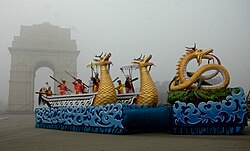Ngaleima
| Ngaleima | |
|---|---|
Goddess of fish | |
| Member of Lairembis | |
 "Ngaleima", the Ancient Meitei name of the goddess, written in archaic Meetei Mayek abugida | |
| Other names |
|
| Affiliation | Meitei mythology (Manipuri mythology) and Meitei religion (Sanamahism) |
| Abode | Underwater world |
| Animals | Fish |
| Symbol | Fish |
| Texts | PuYas |
| Gender | Female |
| Region | Ancient Kangleipak (Antique Manipur) |
| Ethnic group | Meitei ethnicity |
| Festivals | Lai Haraoba |
| Personal information | |
| Parents |
|
| Siblings | |
| Greek equivalent | Amphitrite |
| Roman equivalent | Salacia |
Template:Infobox Sanamahist term
| Part of a series on |
| Meitei mythology |
|---|
 |
Template:Sanamahism Lemlei Ngaleima (Old Manipuri: ꯂꯦꯝꯂꯩ ꯉꯥꯂꯩꯃ, romanized: lem-lei ngaa-lei-ma, lit. 'fish goddess') or Ngareima (Meitei: ꯉꯥꯔꯩꯃ, romanized: ngaa-rei-ma) is the goddess and the divine female personification of the fishes and the aquatic life in Meitei mythology and religion (Sanamahism) of Ancient Manipur (Antique Kangleipak).[1][2][3][4] She is a sister (or friend) of the goddesses, Phouoibi, Thumleima and Ereima (Ireima).[1][2][3][4]
Etymology[edit | edit source]
The Meitei female given name "Ngaleima" (ꯉꯥꯂꯩꯃ) is made up of two words. The two words are "Nga" (ꯉꯥ) and "Leima" (ꯂꯩꯃ). "Nga" (ꯉꯥ) has multiple meanings. It may mean to incline or to lean in verbal form. It means fish in noun form. Here, the word "Nga" (ꯉꯥ) refers to "fish".[5] The word "Leima" (ꯂꯩꯃ) means queen, mistress or lady.[6]
Myths[edit | edit source]
Menstrual blood, charoo (hay, dried paddy stalks), hentak (edible fish paste), sumjit (broom) are considered unholy to Goddess Ngaleima.[7] So, if there is an adverse entry of fish into the fishing nets, the presence of menstruating woman is highly suspected at the spot, especially on the floating dam.[7] Other suspicious reasons are the dropping down of the charoo (hay, dried paddy stalks) or hentak (edible fish paste) or sumjit (broom) by people out of jealousy into the place.[7]
Association with other goddesses[edit | edit source]
Goddess Ngaleima (Ngareima) is considered to be one of the divine manifestations of Leimarel (Leimalel), the supreme mother earth goddess. It is said that Leimalel becomes Ngaleima when she is in the fish yard.[8]
In popular culture[edit | edit source]
- Phou-oibi, the rice goddess is a 2009 ballad opera performed by the Laihui Ensemble. It is based on the story of the goddess and her sister Phouoibi.[9][10]
- Phouoibi Shayon is a 2017 Manipuri mythology movie based on the story of the goddess and her sister Phouoibi.[11][12][13]
See also[edit | edit source]
- Imoinu (Emoinu) - Meitei goddess of wealth
- Ireima (Ereima) - Meitei goddess of water
- Leimarel (Leimalel) - Meitei goddess of earth
- Panthoibi - Meitei goddess of civilization, love and warfare
- Phouoibi (Phouleima) - Meitei goddess of agricultural crops
- Thumleima - Meitei goddess of salt
References[edit | edit source]
- ↑ 1.0 1.1 Devi, Lairenlakpam Bino (2002). The Lois of Manipur: Andro, Khurkhul, Phayeng and Sekmai. Mittal Publications. ISBN 978-81-7099-849-5.
- ↑ 2.0 2.1 Session, North East India History Association (2003). Proceedings of North East India History Association. The Association.
- ↑ 3.0 3.1 The Eastern Anthropologist. Ethnographic and Folk Culture Society, U.P. 1974.
- ↑ 4.0 4.1 Bahadur), Sarat Chandra Roy (Rai (1970). Man in India. A. K. Bose.
- ↑ "Learners' Manipuri-English dictionary.Nga". uchicago.edu. 2006.
- ↑ "Learners' Manipuri-English dictionary.Leima". uchicago.edu. 2006.
- ↑ 7.0 7.1 7.2 ACL-CPL 00128 Man In India Vol.50 1970 Oct-Dec.
- ↑ Singh, L. Bhagyachandra (1991). A Critical Study Of The Religious Philosophy. p. 73.
- ↑ "Laihui Ensemble Manipur – Phou-oibi, the Rice Goddess to perform at Esplanade Theatre Studio Singapore". www.manipur.org.
- ↑ "Phou-Oibi, the Rice Goddess by Laihui Ensemble". sgmagazine.com.
- ↑ "Phouoibi Shayon to be shown at Shankar : 01st apr17 ~ E-Pao! Headlines". e-pao.net.
- ↑ "Phouoibi Shayon to be shown at Shankar – Manipur News".
- ↑ Gurumayum, Maheshwar. "Film Release - Imphal Times". www.imphaltimes.com.
External links[edit | edit source]
- Pages using Lang-xx templates
- Abundance deities
- Abundance goddesses
- Animal deities
- Animal goddesses
- Arts deities
- Arts goddesses
- Beauty deities
- Beauty goddesses
- Fertility deities
- Fertility goddesses
- Fortune deities
- Fortune goddesses
- Leima
- Magic deities
- Magic goddesses
- Maintenance deities
- Maintenance goddesses
- Meitei gods and goddesses
- Names of God in Sanamahism
- Nature deities
- Nature goddesses
- Pastoral deities
- Pastoral goddesses
- Peace deities
- Peace goddesses
- Savior deities
- Savior goddesses
- Time and fate deities
- Time and fate goddesses
- Virgin goddesses